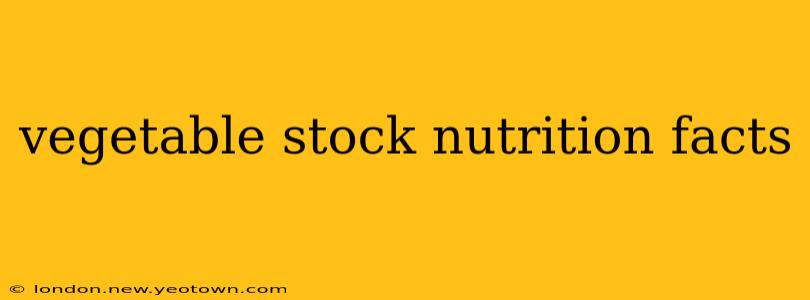Vegetable stock, that humble base for so many delicious soups, stews, and sauces, often gets overlooked. But this clear, flavorful liquid is more than just a culinary workhorse; it's a surprisingly nutritious addition to your diet. Let's delve into the world of vegetable stock, exploring its nutritional profile and uncovering its often-unsung health benefits.
My journey into the world of vegetable stock began years ago, in my grandmother's kitchen. The aroma of simmering vegetables – carrots, celery, onions, the occasional parsnip or leek – filled the air, a fragrant promise of hearty meals to come. It wasn't just the taste that captivated me; it was the sense of wholesome goodness, the feeling that I was consuming something deeply nourishing. Now, armed with a deeper understanding of nutrition, I want to share that knowledge with you.
What are the Nutritional Benefits of Vegetable Stock?
While the nutritional content of vegetable stock varies depending on the vegetables used and the preparation method, generally, it's low in calories and fat, making it a healthy choice for those watching their weight. The key benefits often come from the minerals leached from the vegetables during the simmering process.
Key Nutrients: Vegetable stock is a good source of several essential minerals, including:
- Potassium: Crucial for maintaining fluid balance and supporting muscle function.
- Magnesium: Plays a vital role in hundreds of bodily processes, including muscle and nerve function, blood sugar control, and blood pressure regulation.
- Calcium: Essential for strong bones and teeth.
- Phosphorus: Important for energy production and maintaining healthy bones.
- Sodium: While vegetable stock naturally contains some sodium, it's typically significantly lower than commercially produced broths. However, be mindful of added salt during preparation.
Is Vegetable Stock Good for Weight Loss?
Yes, vegetable stock can be a helpful component of a weight-loss diet. Its low-calorie and low-fat nature makes it an ideal substitute for higher-calorie broths or sauces. It can add flavor and depth to meals without significantly increasing the calorie count.
How Many Calories are in Vegetable Stock?
A typical serving (about one cup) of homemade vegetable stock contains only about 10-15 calories. This calorie count can vary slightly depending on the vegetables used and any added seasonings. Store-bought options might have slightly higher calorie counts due to added ingredients or thicker consistency.
What are the Ingredients in Vegetable Stock?
The beauty of vegetable stock lies in its simplicity. The foundation typically includes aromatic vegetables like onions, carrots, and celery. However, you can expand on this base with many other vegetables:
- Root Vegetables: Parsnips, turnips, beets
- Alliums: Garlic, leeks, shallots
- Other Vegetables: Mushrooms, tomatoes, bell peppers, zucchini
How to Make Healthy Vegetable Stock?
Creating your own vegetable stock allows for maximum control over ingredients and sodium content. The process is surprisingly easy:
- Gather your vegetables: Choose a mix of vegetables for a complex flavor profile.
- Roughly chop: No need for precision here – larger chunks are perfectly fine.
- Simmer: Gently simmer the vegetables in water for at least an hour, or even longer for a richer flavor.
- Strain: Once simmered, strain the stock through a fine-mesh sieve to remove the vegetable solids.
- Cool and store: Allow the stock to cool completely before storing it in airtight containers in the refrigerator or freezer.
Making your own vegetable stock isn't just healthier; it's also a deeply satisfying and economical process. The aroma alone is worth the effort! It's a testament to the power of simple, wholesome ingredients and the magic of slow cooking. Enjoy the deliciousness and the nutritional benefits!

